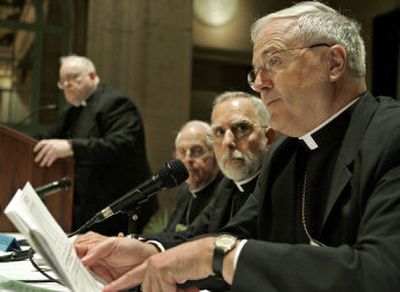Translation of Mass approved by bishops

LOS ANGELES – The nation’s Roman Catholic bishops signed off Thursday on a new English translation for the Mass that would change prayers ingrained in the memories of millions of American parishioners.
The U.S. Conference of Catholic Bishops voted at its biannual meeting for a new translation after a brief but vigorous debate over several small changes in wording. The 173-29 vote on the Order of the Mass was aimed at satisfying Vatican calls for a translation that’s closer to the Latin version.
Before Mass changes at the parish level, the Americans’ version must go to offices in the Holy See for final approval. The bishops’ leader on the issue said that process could take years.
“Without a doubt, this is the most significant liturgical action to come before this body for many years,” said Bishop Donald Trautman, chairman of the conference’s Committee on Liturgy.
The new translation alters the wording of key texts spoken by Catholics during worship, including the Nicene Creed, the Gloria, the Penitential Rite, the Sanctus and Communion.
Some have worried about changing a fundamental rite of worship that is so much a part of Catholic identity, especially now. Mass attendance has been declining, the priest shortage has left a growing number of churches without a resident cleric, bishops and parishioners have been battling over the closure of old churches and schools, and the prelates have been trying to rebuild trust in their leadership after the clergy sex abuse crisis.
Prior to the meeting, the Rev. Thomas Reese, a senior fellow at the Woodstock Theological Center at Georgetown University and a Jesuit priest, said the new Mass would “cause chaos and real problems and the people who are going to be at the brunt end of it are the poor priests in the parishes.”
Trautman acknowledged the adjustment could be difficult. “I think we all recognize that our priests are overburdened now and stretched thin,” he said. “We do believe, however, that this is important for the worship life of the Church.”
Bishops debated for about 20 minutes on a variety of wording changes, some pitting the familiar against the new. A proposal to change the words of the Nicene Creed from “one in being” to “consubstantial,” which is closer to the Latin, failed.